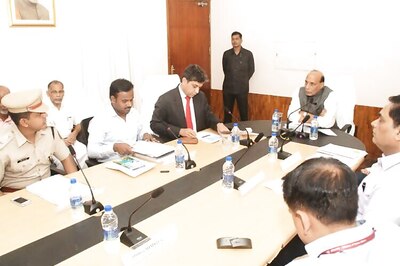
views
PALAKKAD: The lean and frail Dayabhai can easily be mistaken for an ordinary woman burdened with domestic woes. However, hidden in her lean frame, cotton sari and unkempt looks is the nerves of steel determined to take on the mighty and powerful for the betterment of the tribal people and the downtrodden. Very few would imagine that Dayabhai, who has been working and living with the tribesmen in the remote areas of Madhya Pradesh for the last 31 years, is from Pala in Kottayam. She was once Mercy Mathew who left Kerala for good when she was just 18.Express caught up with her when she came to the district to attend the 15th anniversary celebrations of the Devashrayam Charitable Society. In a tete-a-tete, Dayabhai opens up on various issues concerning the tribal people and on how she decided to spend her life with them working for their welfare.“I did my schooling here, completed my degree in Bihar and did a masters in social work from Mumbai. All along, I lived with the villagers , slept in the verandah of their huts, cooked myself, worked in the fields for daily wages which were paid as grains, and spent my time fighting human rights violations”, says Dayabhai. Dayabhai adds it was her life - working in fields and living a life simpler than the villagers themselves - that prompted the tribal people to identify themselves with her. She says the tribal population in Madhya Pradesh are on their transition phase. “Most of the tribal youth are abandoning the culture and tradition and are imitating their mainstream counterparts,” she said and adds that however, once a tribal man gets empowered, he joins the exploitative class. “Generally, when anybody become a member or a Sarpanch of any Panchayat, he gets alienated from the tribal population and joins the exploitative class”, she said. However, there is a ray of hope. “The students have now begun to enrol in schools with the government providing incentives for girl students along with other facilities, including cycles, scholarships, uniforms and slippers. Yet it is a very long journey”, she adds. Dayabhai says she does not accept government awards. However, her fight for the sidelined population have earned her several awards. She also teaches at nearby schools and fights legal battles for the exploited women. “During the World Trade Organisation meet in Honkong, I organised street plays with the help of some students to educate them of the ill-effects of the pact. One of my prime duties is to impart education to the tribal people. I had set up a tribal school and enrolled students at Tinsai village. But, there were a lot of resistance from the local panchayat. However, a seven-year long fight did yield results with the government taking over the school recently”, Dayabhai said.And, it is exactly this ‘resistance’, she says, that deters the development of the tribal population. “The tribal people are wholly dependent on the local moneylenders”. And, the police are equally uninterested in the tribal people. Dayabhai shares an incident: “An Adivasi girl was kidnapped from her village and sold for `60,000 in Agra. With the help of a lawyer who took no fees, I rescued the girl and gave her to her parents. However,the police have not yet arrested the main person behind the crime yet.” However, the farmer in Dayabhai is content. “I have transformed a barren land into a cultivable one. I practise organic farming and cultivate paddy, maize, jowar, wheat, chola, groundnut, peas, black gram and fruits also,” she said.



















Comments
0 comment